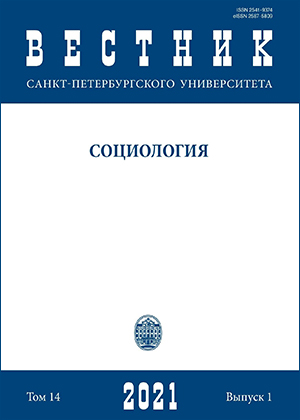Russian working youth: Strategies to achieve wellbeing
DOI:
https://doi.org/10.21638/spbu12.2021.103Abstract
The article presents the results of the analysis of strategies to achieve wellbeing among Russian working youth. The analysis is based on the survey of 1121 respondents between 20 and 30 years old, living in Moscow and major cities of eight federal districts of Russia. The article describes the following five strategies. (1) “Familism” is a predominantly female strategy directed at attaining a work-life balance. It is characterized by high life satisfaction, low work and career satisfaction, as well as by low labor mobility. (2) “Rational consumerism” includes the economical use of family resources and savings activities. It reflects the predominance of materialistic values, an orientation towards a moderate and quiet life, and the absence of
professional ambitions. (3) “Networking and entrepreneurship” is a pronounced achievementoriented strategy directed at the accumulation of social capital and entrepreneurial activity. The strategy is characterized by moral nihilism and by orientations towards personal responsibility and self-efficiency. (4) “Investing in professional development” is a work-centric strategy focused on increasing professional knowledge and the acquisition of new professional skills, together with increasing work efforts. This is a predominantly male strategy, more typical for respondents from Russian regions compared to Moscow. (5) “Civic activism” is a less frequently mentioned strategy directed at protecting one’s rights and participation in public and political life. It is common mainly for those living in Moscow. The analysis reveals that these five strategies are shaped by different combinations of the respondents’ individual characteristics, values and orientations, industry of employment, residency, and organizational practices. It was determined that some strategies are developed by the mechanism of accumulating advantages while others are predominantly compensatory in their nature.
Keywords:
working youth, strategies to achieve wellbeing, work-life balance, life values, work values, self-efficacy
Downloads
References
References
Downloads
Published
How to Cite
Issue
Section
License
Articles of "Vestnik of Saint Petersburg University. Sociology" are open access distributed under the terms of the License Agreement with Saint Petersburg State University, which permits to the authors unrestricted distribution and self-archiving free of charge.




